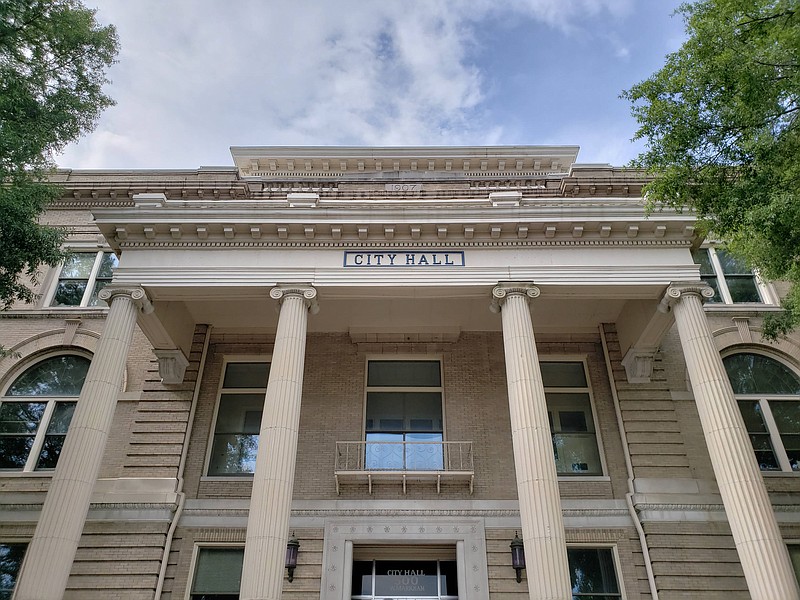The Little Rock Board of Directors in a 7-3 vote Tuesday evening approved a measure designating misdemeanor marijuana offenses as the lowest priority for the city's law enforcement authorities.
The ordinance was sponsored by City Director Ken Richardson of Ward 2. It was his third try at securing approval for a version of the ordinance after attempts in 2018 and 2019 failed to get support from a majority of board members.
City Directors Dean Kumpuris, Capi Peck, Doris Wright, Kathy Webb, Antwan Phillips and Erma Hendrix voted with Richardson to approve the ordinance. Hendrix initially voted "present" before changing her vote.
City Directors Joan Adcock and B.J. Wyrick along with Vice Mayor Lance Hines voted against the measure.
Although medical marijuana was authorized by Arkansas voters in 2016, recreational use remains illegal in the state.
The ordinance stipulates that "investigations, citations, arrests, property seizures, etc. for adult misdemeanor marijuana offenses" be made the lowest law enforcement and prosecutorial priority when possession of marijuana is intended only for personal use.
The measure does not apply to statutes related to driving under the influence, operating machinery while impaired, and violent or gun-related crimes as well as laws "designed to prevent physical injury to others," according to the ordinance's text.
Additionally, the measure requires notification to state and federal elected officials who represent all or a portion of Little Rock that the ordinance has been enacted.
The cities of Fayetteville and Eureka Springs have existing low-priority policies with regard to marijuana.
During the meeting Tuesday, Richardson referred to racial disparities among the individuals cited for marijuana based on data out of Dallas, and he suggested that "it's an issue where we patrol certain neighborhoods certain ways."
He described the enforcement of misdemeanors as an unfair burden on police and on the Pulaski County jail.
Richardson emphasized that he was not calling for legalization or decriminalization of marijuana. He said he was not talking about the "Tony Montanas" or the "Pablo Escobars" of the world.
"It's a policy that has an impact on us and our finances and our Police Department and our jail space," Richardson said.
When asked about Police Chief Keith Humphrey's stance on the proposal, Little Rock Police Department spokesman Mark Edwards declined to comment in an email Tuesday morning.
Kumpuris asked Humphrey to go to the podium during the meeting for the chief to comment on the ordinance as well as its potential effects on policing in the city.
Humphrey said the document does not decriminalize marijuana. He added that the "Little Rock Police Department has not arrested anyone physically for the sole purpose of small amounts of marijuana in several years, even under the leadership of my predecessor. As a matter of fact, we already cite and release."
When police make contact with an individual who has a small amount of marijuana, an officer might sometimes ask the person to throw it in the trash, Humphrey said, so the individual may not have to carry the offense on his or her record.
Nevertheless, Humphrey said, "this is not something that I recommend."
Regarding Richardson's measure, Humphrey said: "We already do that, what he's asking. The problem is, I think, with Director Richardson, he wants it documented. And I will tell you that there's a concern when you start prioritizing or listing what's a priority in the criminal-code book."
He suggested the effort could "open a Pandora's box," referring to other low-level misdemeanor offenses such as speeding, shoplifting or vandalism.
"All crime should be a priority for a Police Department, but there are those that we do have flexibility in writing tickets or telling someone -- maybe taking someone directly to their parent," Humphrey said.
He added that with enactment of the ordinance, there will be individuals in the community who will hear: "Oh, it's legal to smoke marijuana in the city of Little Rock. It's legal to possess marijuana in the city of Little Rock."
When pressed by Kumpuris on his feelings about whether the measure would help or hurt the Police Department, Humphrey reiterated the department was already doing what the ordinance entails.
City Attorney Tom Carpenter said there was no difference between a citation and an arrest, describing citations as just one form of an arrest.
"It's meant to recognize offenses that are not that serious that don't necessarily mandate that we take somebody to the jail and let a release decision be made or that a bond decision be made," Carpenter said.
In terms of the measure's effect on a prosecutor, Carpenter said it would be "nothing. The prosecutor's going to do what they wish to do."
But referring to other crimes such as shoplifting or vandalism, Carpenter said, "I think the question for the board is, do we ever say, 'This is a crime we do not wish to enforce as much?'"
Though procedures exist to have offenses sealed or struck from an individual's record, Carpenter suggested that "in this day and age," people can still get access to the records.
At the meeting, Hines said the proposed ordinance "sends the completely wrong message from this body and the city as a whole to what's acceptable in our city."
Hines said the state has already provided a legal venue for those who want to smoke marijuana via the medical-marijuana law.
He added that Richardson's proposal will be mistaken by individuals who think it is OK to smoke marijuana on the streets of Little Rock.
Hines said he had seen videos of people "blazing up while they're caravanning," referring to the practice of large groups of vehicles traveling together, a trend that has plagued city officials since last year.
In response, Richardson denied the ordinance would send the message that it is OK to smoke marijuana in the city.
If the policy is already the Police Department's approach, then the approach would be better codified via the ordinance instead of left to the discretion of the department, Richardson suggested.
